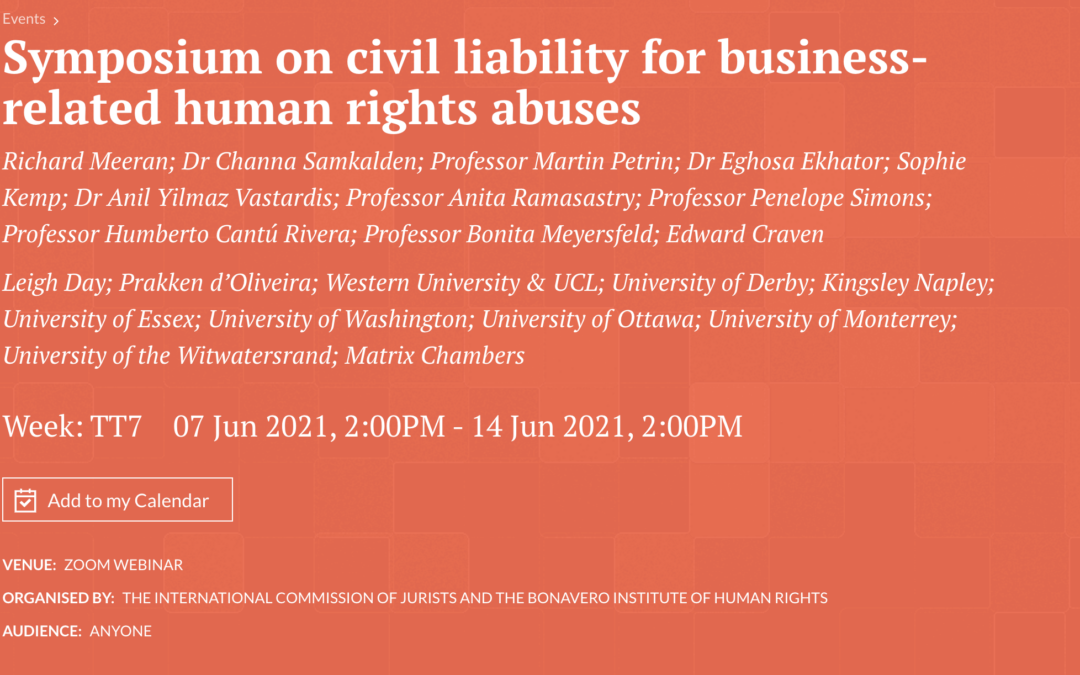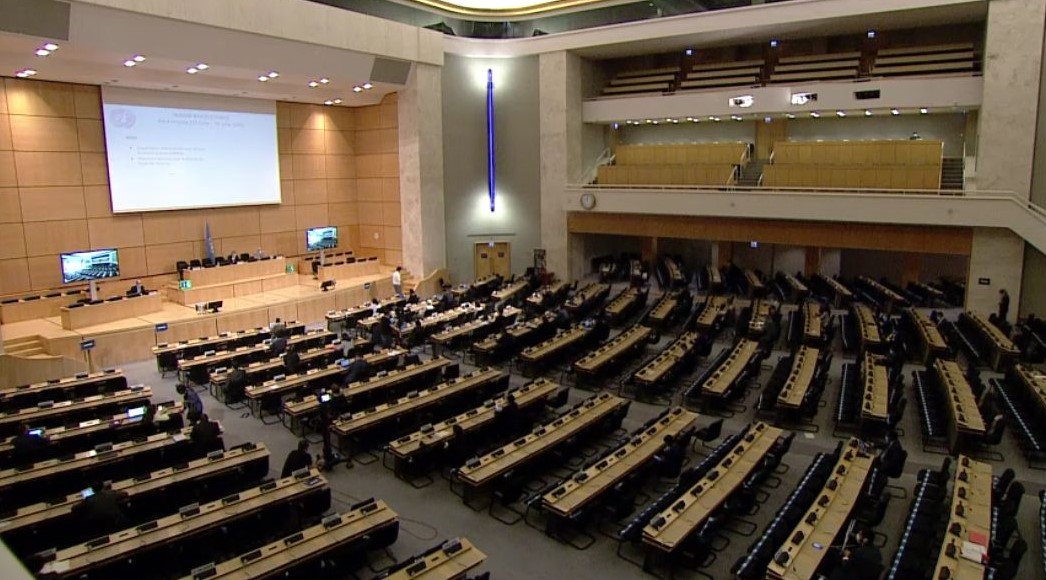
Jun 4, 2021 | Agendas, Events, News
As part of its work to raise awareness and deepen the understanding about the importance of civil liability for the objective of improved accountability of business-related human rights abuses and access to justice and reparations, the ICJ is partnering with the Bonavero Institute of Human Rights to organize an online symposium.
The symposium is open to practitioners, policymakers, civil society, academics, and students working on these subjects. It will feature two panel discussions on Zoom on 7 June 2021 and 14 June 2021.
Past decades saw an emerging trend towards reliance on civil liability claims to address business-related human rights abuses (e.g., Lungowe v Vedanta and Okpabi v Shell in the UK; Choc v Hudbay Minerals and Araya v Nevsun in Canada; Akpan v Shell in the Netherlands; Jabir and others v KiK Textilien in Germany).
The ICJ and the Bonavero Institute of Human Rights’ symposium will discuss the wider implications of recent jurisprudence and identify the remaining gaps in the law.
The discussions will focus on a range of issues, including 1) the contours of rules on the duty of care; 2) prospects for supply chain liability under the law of civil remedies; 3) parent company liability and complicity under civil law; 4) prospects of access to justice.
Please follow the links below to register separately for each panel. The symposium will also involve a series of blogs by experts in the field to be published by Opinio Juris starting 21 June 2021.
Panel 1 ‘Duty of care and parent company liability’
Day and time: 7 June 2021 at 14.00 – 16.00 BST
To register for Panel 1, please click here
Panel 2 ‘Access to justice and civil claims for business-related human rights abuses: Challenges and opportunities’
Day and time: 14 June 2021 at 14.00 – 16.00 BST
To register for Panel 2, please click here
This symposium is co-convened by Dr Carlos Lopez and Dr Ekaterina Aristova. Please get in touch with the organisers if you have any questions. The symposium is part of the project on civil liability for human rights violations led by the Bonavero Institute and funded by the Oak Foundation.

Mar 16, 2021 | News
The participation of private actors including pharmaceutical companies in the development and delivery of COVID-19 vaccines has important implications for human rights, in particular the rights to life and to health, that have not been properly considered, a panel of experts asserted in a webinar organized by the South African Institute for Advanced Constitutional, Public, Human Rights and International Law (SAIFAC), the ICJ and the Konrad Adenauer Stiftung (KAS) on March 11.
Taking place exactly one year after the World Health Organization declared COVID-19 a global pandemic, the webinar, entitled “What are the obligations of States and corporations to ensure access to a COVID-19 vaccine?”, brought together Dr Sharifah Sekalala from the University of Warwick, Fatima Hassan, the founder and head of the Health Justice Initiative, and Prof. David Bilchitz, the director of SAIFAC.
As the United Nations Committee on Economic, Social and Cultural Rights (CESCR) has recently reaffirmed, vaccine access raises human rights issues relating to both the obligations of States and the responsibilities of businesses.
Carlos Lopez, ICJ’s Senior Legal Adviser stressed:
“It is clear that States have a duty to protect the right to health which entails an obligation to appropriately regulate private actors in health – including those involved in vaccine production and distribution – to retain the affordability and accessibility of COVID-19 vaccines for all. Corporate entities, for their part, have a responsibility to respect the right to health which they violate when they adopt practices which limit or inhibit non-discriminatory vaccine access to all people around the world.”
One of the main elements in the debate is the issue of people’s access to vaccines that are adequate and affordable, and how the capacity of the States to fulfil this key aspect of their international law obligations is being constrained by the operation of certain trade and intellectual property rights law, in particular the Trade-Related Intellectual Property Rights (TRIPS) Agreement of the WTO.
Dr Sekalala, pointed to a fundamental underlying issue relating to the predominant rationale of States and companies:
“One of the things that bothers me as a global health lawyer is the lack of transparency around this process and also, in some ways, the fact that States are still clinging on this research and development rationale, maintaining intellectual property rights”.
This also raises serious questions about the nature of the responsibilities that corporate entities may have to respect the right to health, as has been clarified in General Comment 24 of the CESCR and the UN Guiding Principles on Business and Human Rights.
“There is a moral dimension to the question about vaccine access: what should society expect of the corporations? And there is also a legal one: what does the law require? Fundamental rights are essentially urgent moral claims that demand legal institutionalization. Fundamental rights recognized in international law, in the South African Constitution and many other constitutions around the world require, in my view, that corporations have positive obligations but if such positive obligations are not recognized in legal systems, domestically or internationally, the claim is they ought to be”, said Professor Bilchitz.
Although vaccine access may implicate human rights responsibilities of a range of private business entities, such considerations are especially pronounced with regard to pharmaceutical companies given the direct impact of their business operations on vaccine access. Vaccine access raises clear issues about the protection of human rights and the rule of law both internationally and in particular domestic jurisdictions like South Africa.
“Pharmaceutical companies and some wealthier governments that have actually co-funded a lot of the accelerated vaccine research are basically using their own law… right now they are acting as if they are God, they are determining access for the entire world, including the Global South. The Constitution has been thrown out of the window, particularly in the domestic context of South Africa”, said Hassan.
Watch the webinar here.
A powerpoint for Dr Sekalala’s presentation is available here.
A powerpoint for Professor Bilchitz’s presentation is available here.
A powerpoint for Fatima Hassan’s presentation is available here.
CONTACT:
Timothy Fish Hodgson, Legal Adviser on Social, Economic and Cultural Rights, e: timothy.hodgson@icj.org
Tanveer Rashid Jeewa, Communications and Legal Officer, e: tanveer.jeewa@icj.org
Mar 5, 2021 | News, Op-eds
An opinion piece by ICJ Commissioner, Rodrigo Uprimny, asks whether the existing COVID-19 vaccine patenting arrangements favouring the intellectual property interests of pharmaceuticals come at an unacceptable cost to protecting the life and health of millions. Commissioner Uprimny is also Researcher at Dejusticia and member of the UN Committee on Economic, Social and Cultural Rights.
During an informal conversation I was asked:
“Why is it that, although so many of us are dying due to COVID-19 and suffering from the dramatic state of the economy, we continue to wait for vaccines despite the availability of so many safe and effective ones? Is it that we cannot produce the vaccines locally?
The answer to this simple but essential question is that vaccine access is no longer a technical but also a political issue.
While Colombia cannot technically manufacture or produce some COVID-19 vaccines such as those based on the RNA messengers, many other countries, including several in the global South such as India, Argentina or Brazil, could. As has been highlighted by Doctors without Borders, there is no technical obstacle to mass vaccine production that would allow to vaccinate every one of the 7.8 billion human beings on earth within a few months
Instead, the obstacle is legal and political. It is the intellectual property that provides patents to pharmaceutical companies, who have developed COVID-19 vaccines. That creates a temporary monopoly. During such a temporary monopoly period, which usually lasts 20 years, no other company can produce their vaccines without permissions. As a consequence, those companies can impose and regulate the prices and conditions for the production of their vaccines.
Patents are defended by high-income countries, where many large pharmaceutical companies are based. They argue that there would be no innovation without patents as companies would not have incentives to research and develop new products.
Here, I will not dispute this defense of intellectual property, which is highly debatable. I would instead like to pose this question: even if patents were good and helped innovation, is it fair that they remain intact during the COVID-19 pandemic if they prevent rapid access to vaccines all over the world? The answer to this question is no, because we are condemning millions of people to die, but also because the epidemiological risks are extremely high. Each contagion poses a new risk for a novel coronavirus mutation that may eventually result in a variant that could escape the efficacy of current vaccines. It is also possible that a new mutation has a severe impact on the health of children, who have been somewhat spared from the more lethal impacts of COVID-19 until now.
In light of the current situation, without challenging the institution of intellectual property as such, South Africa and India issued a proposal to the World Trade Organization, the international organization overseeing such trade-related issues. They proposed a temporary exemption (or “waiver”) of patents on vaccines and treatments for COVID-19 at least until the pandemic is under control. A potential, fair compensation for companies who discovered the vaccines might also been considered, although obviously discounting the immense financial support they have already received from public funding.
This temporary exemption is crucial as current flexibilities in patent rights, such as compulsory licenses, are too rigid and limited to face the current crisis. This waiver provides the only opportunity for companies and States, with sufficient technical capabilities, to mass-produce necessary vaccines without having to fear the severe penalties of patent (intellectual property) violations.
While this proposal continues to face resistance from certain countries in the Global North, it is receiving growing support from many states, scientific and humanitarian organizations. Regrettably, the Colombian government has refrained from supporting it, with the shameful argument that more evidence needs to be provided. More evidence of what? Does it not suffice that we currently do not have access to necessary vaccines, although technically we could produce ample amounts? Or that available vaccines are, above all, headed to high-income nations? And is this mainly due to patents on vaccines that, far from being a fair award for innovation, seem to be letters of marque in favor of pharmaceutical companies, without any consideration of deaths and harms caused by the global lack of COVID-19 vaccines?
This op-ed was first published on El Espectador, 27 February 2021.
Download the Op-Ed in English and Spanish.
ICJ Statements on Vaccine Access:
Global: “ICJ calls on States to ensure human rights compliant access to COVID-19 vaccines (UN Statement)”: (1 March 2021)
Global: “ICJ urges the UN Committee on Economic, Social and Cultural Rights to call on States to comply with their obligations to ensure equitable access to vaccines for all” (15 Feb 2021): https://www.icj.org/icj-urges-the-un-committee-on-economic-social-and-cultural-rights-to-call-on-states-to-comply-with-their-obligations-to-ensure-equitable-access-to-vaccines-for-all/
Peru: “The COVID-19 vaccine demands international and national solidarity” (23 Feb 2021): https://www.icj.org/the-covid-19-vaccine-demands-international-and-national-solidarity/
Africa: “The ICJ recommends that the African Union acknowledge COVID-19 vaccines are a “public good” (4 Feb 2021): https://www.icj.org/the-icj-recommends-that-the-african-union-acknowledge-covid-19-vaccines-are-a-public-good/
Zimbabwe: “The ICJ and ZimRights ask for urgent intervention on access to COVID-19 vaccines from African Commission Mechanism” (19 Feb 2021): https://www.icj.org/the-icj-and-zimrights-ask-for-urgent-intervention-on-access-to-covid-19-vaccines-from-african-commission-mechanism/
Further reading:
UN Special Procedures: “COVID-19: UN experts urge WTO cooperation on vaccines to protect global public health” (1 March 2021): https://www.ohchr.org/EN/NewsEvents/Pages/DisplayNews.aspx?NewsID=26817&LangID=E
UN Special Procedures: “Statement by UN Human Rights Experts Universal access to vaccines is essential for prevention and containment of COVID-19 around the world” (9 Nov 2020): https://www.ohchr.org/EN/NewsEvents/Pages/DisplayNews.aspx?NewsID=26484&LangID=E
UN CESCR Committee: “Statement on universal and equitable access to vaccines for the coronavirus disease (COVID-19)” (27 Nov 2020) https://tbinternet.ohchr.org/_layouts/15/treatybodyexternal/Download.aspx?symbolno=E/C.12/2020/2&Lang=en
IACHR and its SRESCER: “IACHR and its SRESCER Call on American States to Make Public Health and Human Rights the Focus of All their Decisions and Policies Concerning the COVID-19 Vaccine” (5 Feb 2021): http://www.oas.org/en/IACHR/jsForm/?File=/en/iachr/media_center/PReleases/2021/027.asp

Nov 29, 2020 | News
The ICJ and its Swiss section (ICJ-CH) regret the results of the vote yesterday in Switzerland rejecting the popular initiative for responsible businesses. While the majority of the popular vote approved the initiative, there was no majority of voters in a majority of Cantons.
Under the Swiss constitution, to be approved, such initiative amending the constitution needs the majority of both the popular vote in Switzerland and in a majority of Cantons part of the Swiss Confederation.
“The strong support gathered by this initiative, expressed in the majority of the popular vote, is encouraging, and a strong message that the Federal Parliament and the Federal Council must take into account in the process of the implementation of the legislative counter-proposal and in further legislation,” said Marco Sassòli, ICJ commissioner.
A counter-proposal prepared by the Federal Council is now approved by default. This counter-proposal foresees due diligence obligations for some sectors and reporting obligations, but no specific legal liability.
The proposed initiative would have required multinationals based in Switzerland to respect human rights also abroad, and to carry out human rights due diligence to identify and prevent potential human rights abuses.
It would also have clarified the multinational’s legal responsibility for violations of internationally recognized human rights and environmental norms by enterprises that it controls and operate abroad.








